With a cuisine that has roots in several parts of the globe, Puerto Rico has some of the best food found in the Caribbean.
Puerto Rican food is a vibrant reflection of its rich cultural heritage, offering a feast of flavors that represent the island’s unique culinary traditions. Signature dishes that embody the spirit of Puerto Rican cuisine include mofongo, a savory dish made from mashed plantains, and tostones, which are deliciously crispy fried plantains.
Other must-try specialties are pasteles, a type of tamale, and arroz con gandules, a flavorful rice dish with pigeon peas. For a sweet treat, tembleque, a coconut-based dessert, and coquito, a coconut-based holiday drink, are beloved by locals and visitors alike. Sampling these traditional Puerto Rican dishes offers a delectable journey into the heart of this vibrant culture.
Eating your way around the island territory is a culinary adventure thanks to the diverse dining options on offer. Upscale restaurants are readily found in places like San Juan, where traditional cuisine with a twist can be found. In contrast, the abundance of food trucks keeps the authentic flavors of Puerto Rico alive. The medley of flavors and creativity sets the cuisine apart and delights the tastebuds.
Traditional Puerto Rican Foods
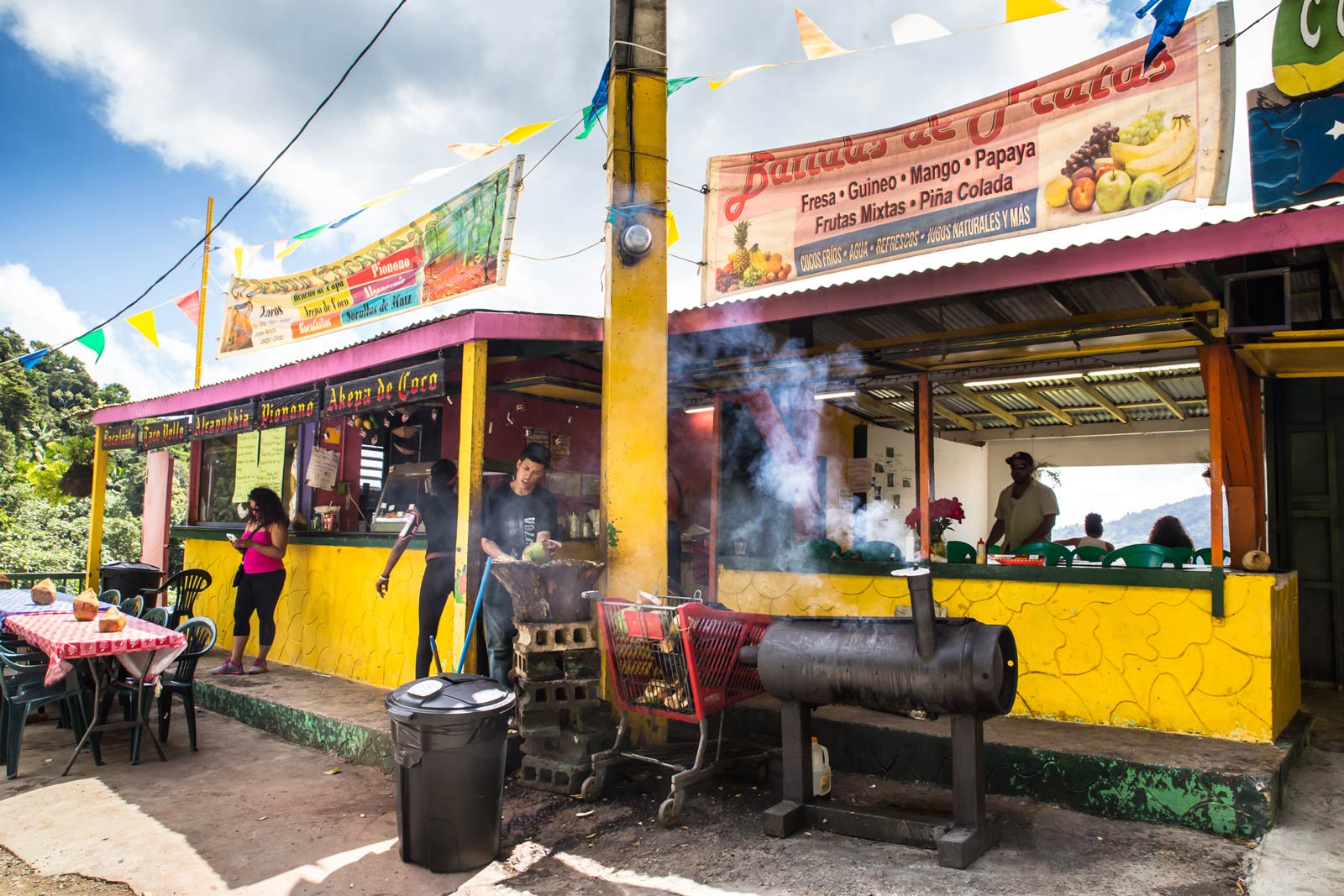
When you sit down to eat in Puerto Rico, you will be greeted with a warm and friendly welcome. What we noticed is that all
Puerto Ricans are eager to share their knowledge and passion for the local cuisine. Chances are you will be offered a small plate of appetizers, or “antojitos,” such as empanadillas, alcapurrias, or tostones, to whet your appetite before the main course.
Puerto Rican cuisine is known for its bold and flavorful dishes, often featuring a combination of spices, herbs, and aromatics that give the food a distinctive taste and aroma. Many dishes are also accompanied by traditional sides such as rice and beans, sweet plantains, or yucca, which complement the flavors of the main dish.
From the national dish Arroz Con Gandules to scrumptious homegrown deserts, you’ll wake up each morning wanting to try something new. On the fence about traveling to Puerto Rico? Read our guide to why you should visit.
1. Arroz Con Gandules
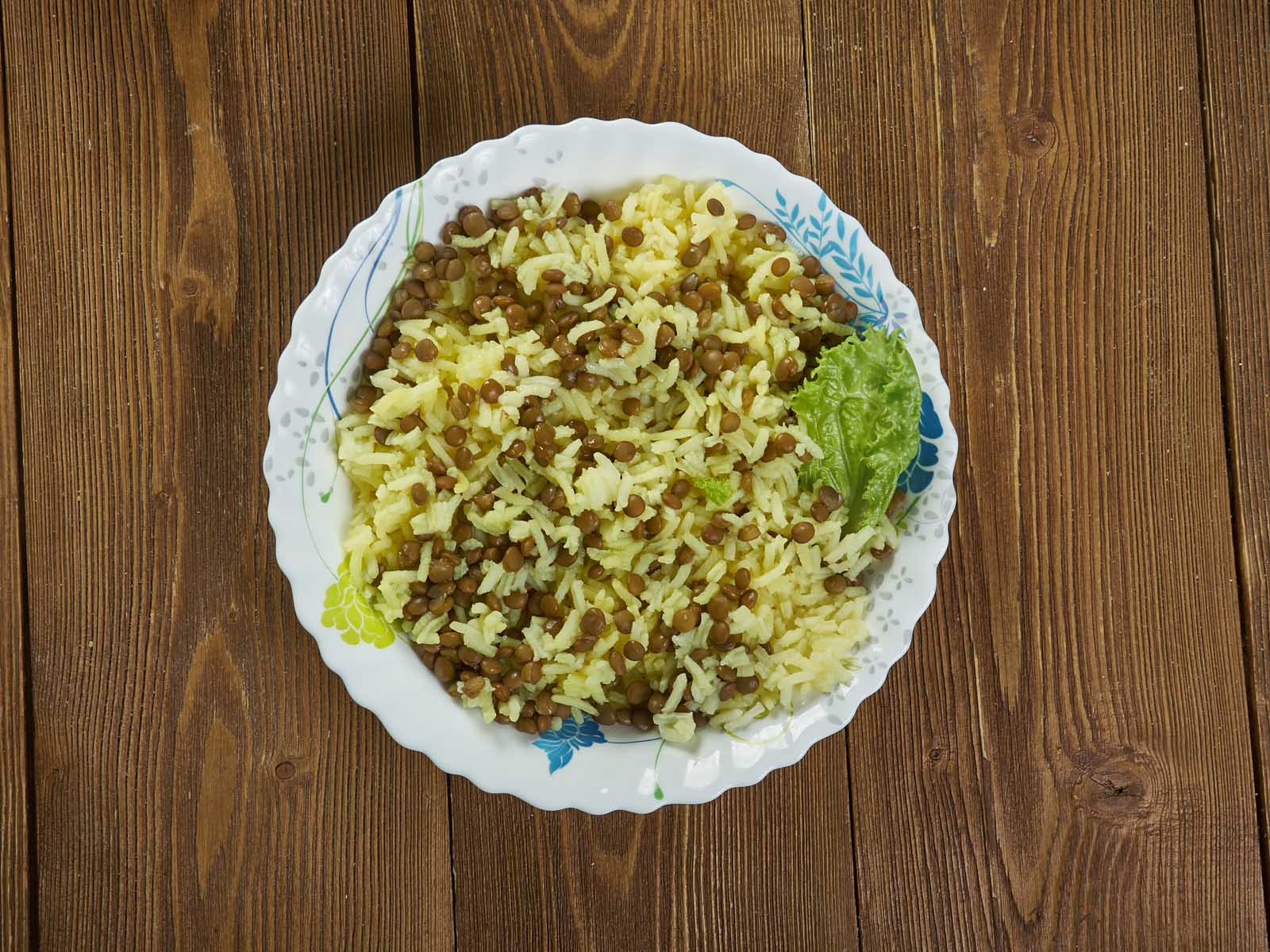
If you’re in tune with popular Puerto Rican foods, then you know that Arroz Con Gandules was going to start off our guide. Well, better late than never, the national dish of Puerto Rico is a traditional meal that has been cooked in the territory for centuries.
The one-pot Puerto Rican rice dish comprises pigeon peas and Sofrito, with every household in Puerto Rico having its own twist. Sofrito is a flavor that is found in a lot of Puerto Rican food. The flavor is made up of coriander, garlic, onions, and green peppers.
The traditional version of Arroz Con Gandules or Puerto Rican rice is a vegetarian meal. However, sausages and pork are common additions. While bacon is sometimes cooked with the Sofrito, to create a smoky flavor.
2. Empanadillas

Similar to Mexican Empanadas, Empanadillas are savory pastries and one of the best dishes to try in Puerto Rico. Beginning with a simple pastry base, the dish is then stuffed with seasoned meat (you can also use seafood or vegetables). You then fold it into half-moons and fry them in oil until golden brown.
Thinly chopped vegetables, garlic, and oregano are sometimes added for additional flavor. Once fried, Empanadillas tend to have a thicker crust than the Mexican dish. Puerto Rican restaurants sometimes substitute beef for seafood.
3. Tostones
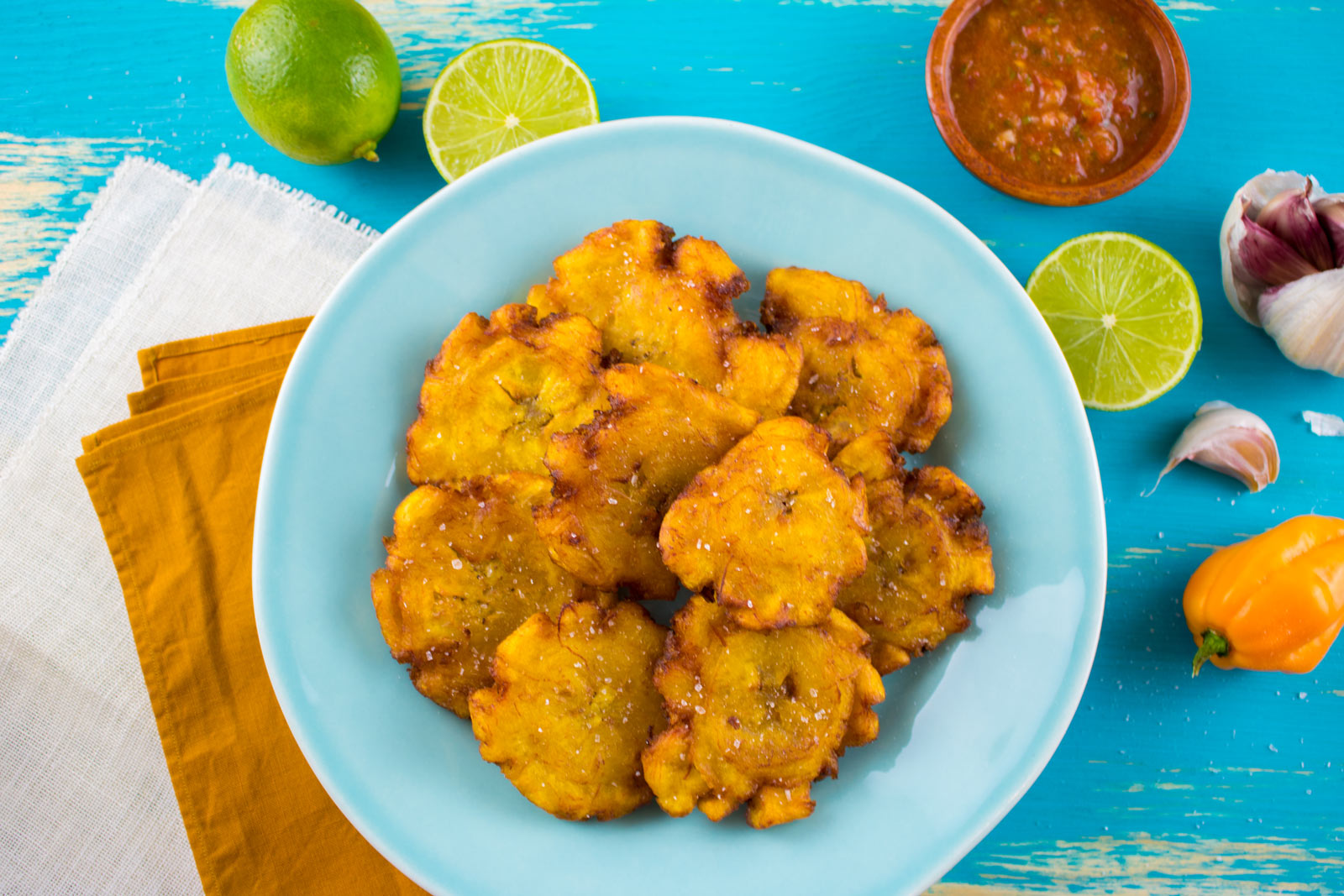
Plantains are the base for many Puerto Rican dishes. So it’s only natural that one of the most famous dishes in Puerto Rico uses them. Similar to Mofongo, Tostones make use of unripe fried green plantains. These were my favourites when we visited Puerto Rico.
The hard green plantains are sliced into pieces before being fried on each side. The plantains are then taken off the pan before being further flattened. They’re then deep-fried once more until golden.
Once cooked, the Tostones are topped with sea salt. They are common side dishes around Puerto Rican restaurants and make for a perfect addition to your meal at home. Dip them in garlic sauce to round out the traditional treat.
4. Pernil
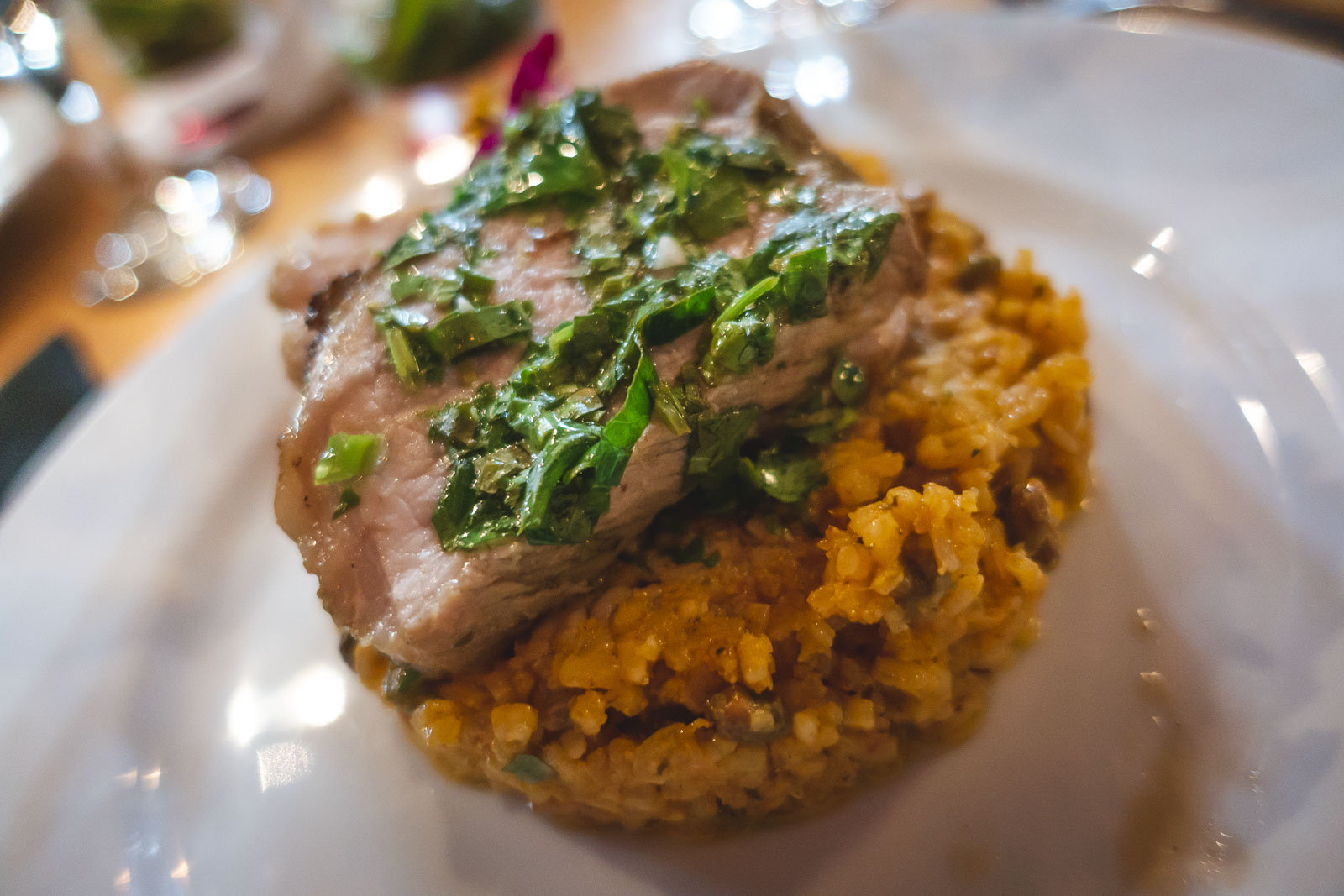
As one of the most iconic Puerto Rican dishes, Pernil comfortably belongs on our list. Pernil is a roast pork shoulder that is soaked in a traditional marinaded named adobo mojado.
The result is a succulent meal and a must-try on your travels around the country. The delicious marinade comprises spices that are common throughout Caribbean cuisine. These are garlic, oregano, vinegar, paprika, and salt.
While the traditional Spanish Pernil uses ham, the Puerto Rican version became popular due to access and being the cheaper option. But locals will tell you it’s the tastier choice and has since become a staple at weddings and festivals. For the full experience, don’t skip that crunchy pork skin.
5. Mofongo
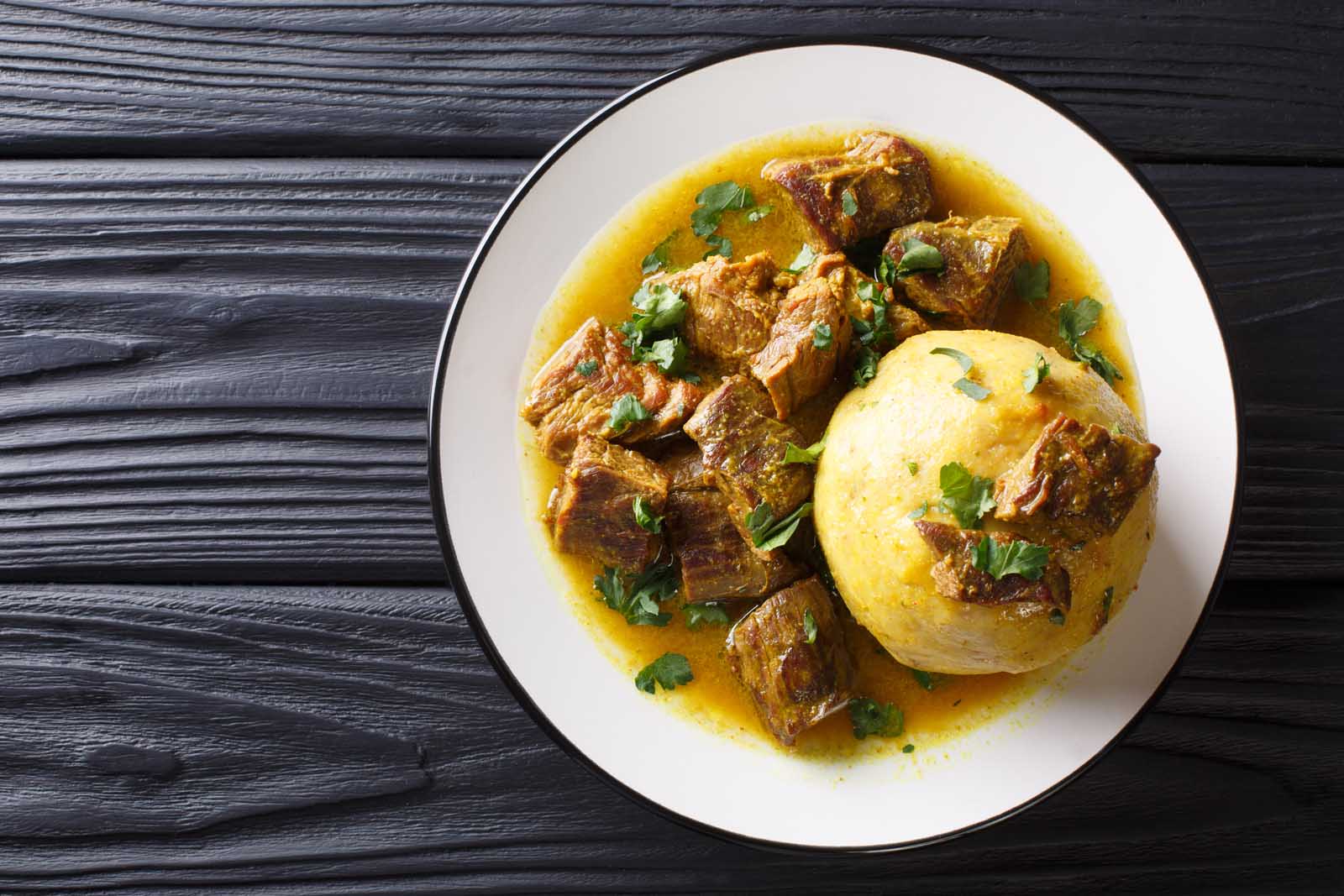
A popular Puerto Rican dish that can also be found in Cuba ( and the Dominican Republic, is Mofongo. Derived from unripe green plantains, the end result is a common vegetarian dish, although you’ll find meat-filling options around Puerto Rico.
Mofongo may be the Puerto Rican version; however, the dish has strong roots in Western Africa. The dish was then brought to Latin America by slaves.
At first, the plantains are sliced, boiled, then fried, and then mashed into a soft texture from which it can absorb the additional spices or extra toppings like chicken, lobster, bacon, or prawn. Mofongo is usually served as a main meal, with the addition of chopped vegetables. But for extra flavor, add a warm broth to the plantains. The starchiness of the dish is perfect for soaking it up!
6. Pastelon
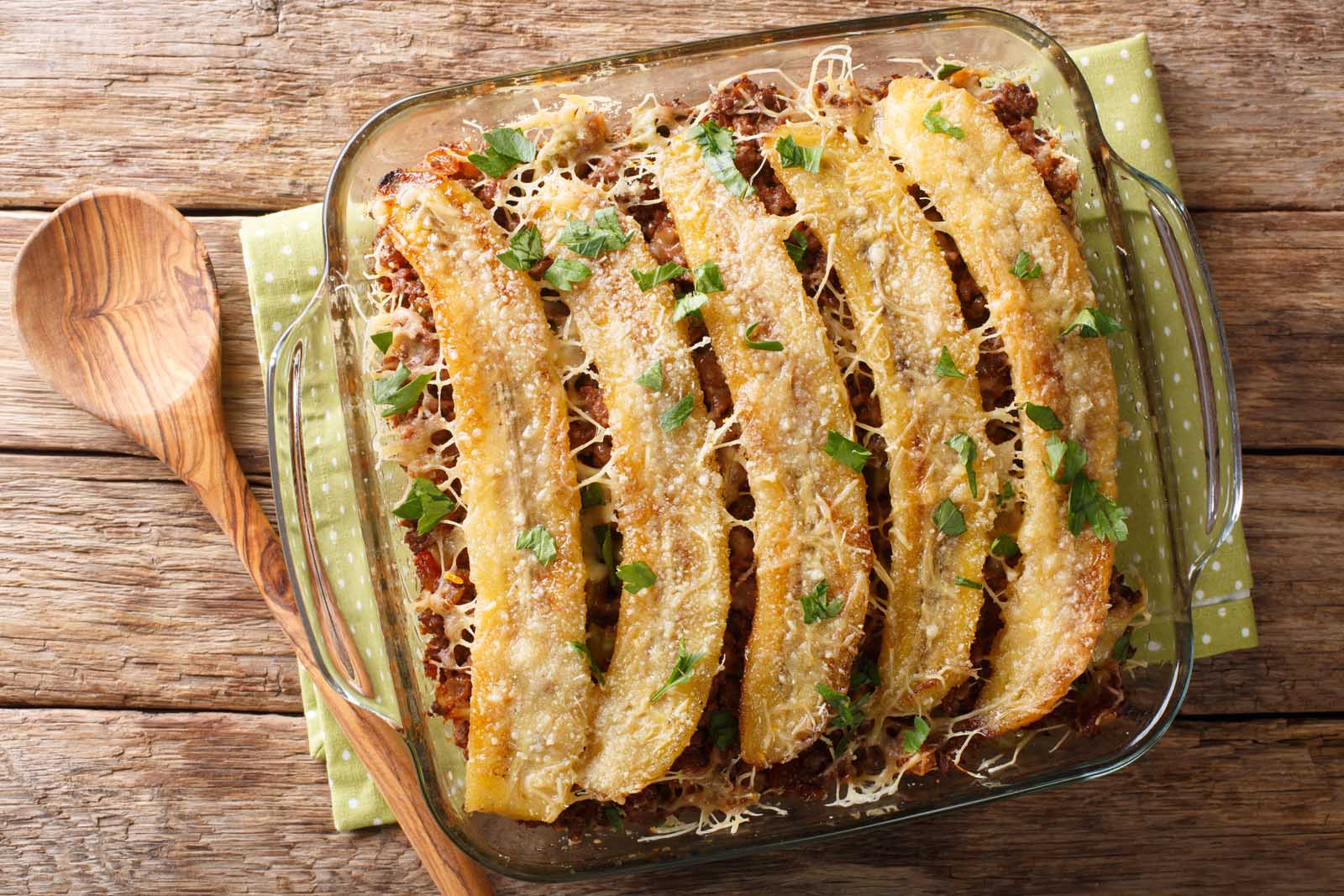
In some ways similar to a traditional Italian Lasagna, Pastelon is a traditional Puerto Rican food that is also popular in Dominican cuisine. The main ingredient for Pastelon is mashed or sliced ripe plantains.
The plantains act as the layer that splits the mincemeat into separate levels. They are used as the Puerto Rican equivalent of Italian noodles. Then, the added meat is first mixed in with tomato sauce. A sauce that changes slightly wherever you’re in Old San Juan or Bayamon. Common additions to the meat, tomato sauce, and plantains are green beans and shredded cheese.
If you’re traveling around Puerto Rico, then you may notice that the name of the dish changes depending on the region. If you can’t find Pastelon on the menu, then keep an eye out for Pinon. Check out our guide to the top ten things to do in the Caribbean.
7. Puerto Rican Pasteles
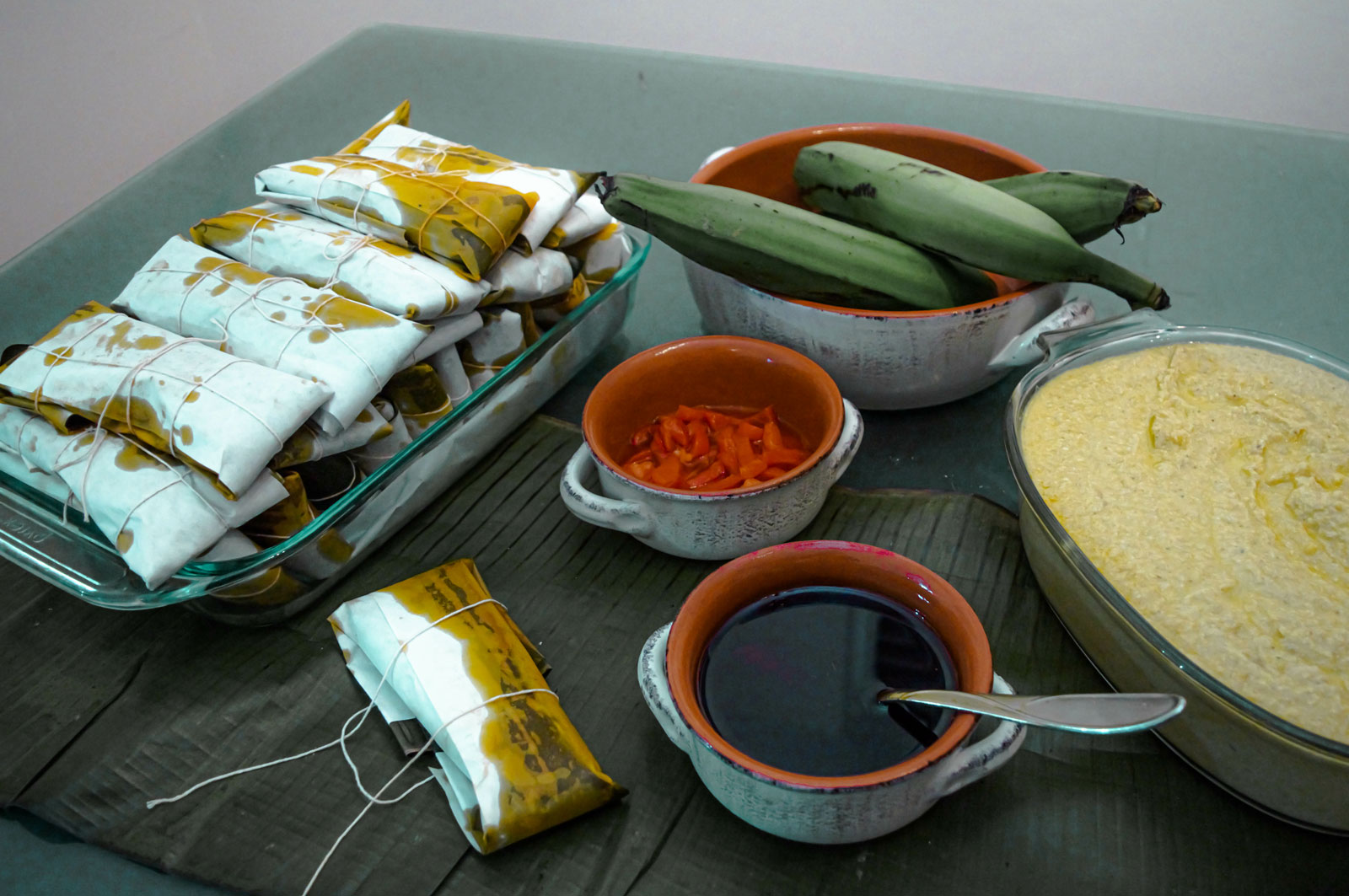
Puerto Rican Pasteles are a traditional dish that is typically enjoyed during the holiday season. These savory treats are made with a mixture of grated green bananas, yucca, and plantains, combined with a seasoned meat filling, and then wrapped in a banana leaf and boiled. The resulting dish is similar to a tamale, but with a distinctly Puerto Rican flavor and texture.
The history of Pasteles can be traced back to the indigenous Taino people of Puerto Rico, who used banana leaves as a way to cook and preserve food. The recipe was later influenced by the Spanish colonizers, who brought over new spices and ingredients. African slaves also contributed to the dish’s development, adding new flavors and techniques to the mix.
To make Pasteles, the first step is to prepare the banana leaf by cleaning and softening it. Then, the filling is made by sautéing a mixture of ground meat (usually pork or chicken), onions, garlic, peppers, and other seasonings. The masa (dough) is made by grating green bananas, yucca, and plantains, then mixing it with oil, milk, and other seasonings until it forms a smooth paste. The banana leaf is then filled with a spoonful of masa and a spoonful of the meat filling, before being wrapped into a neat package and secured with string. The Pasteles are then boiled in salted water for about an hour until the dough is cooked through.
Pasteles are a beloved dish in Puerto Rico and are often enjoyed during the Christmas season with a side of arroz con gandules (rice and pigeon peas) and a slice of pernil (roast pork).
8. Asopao de Pollo
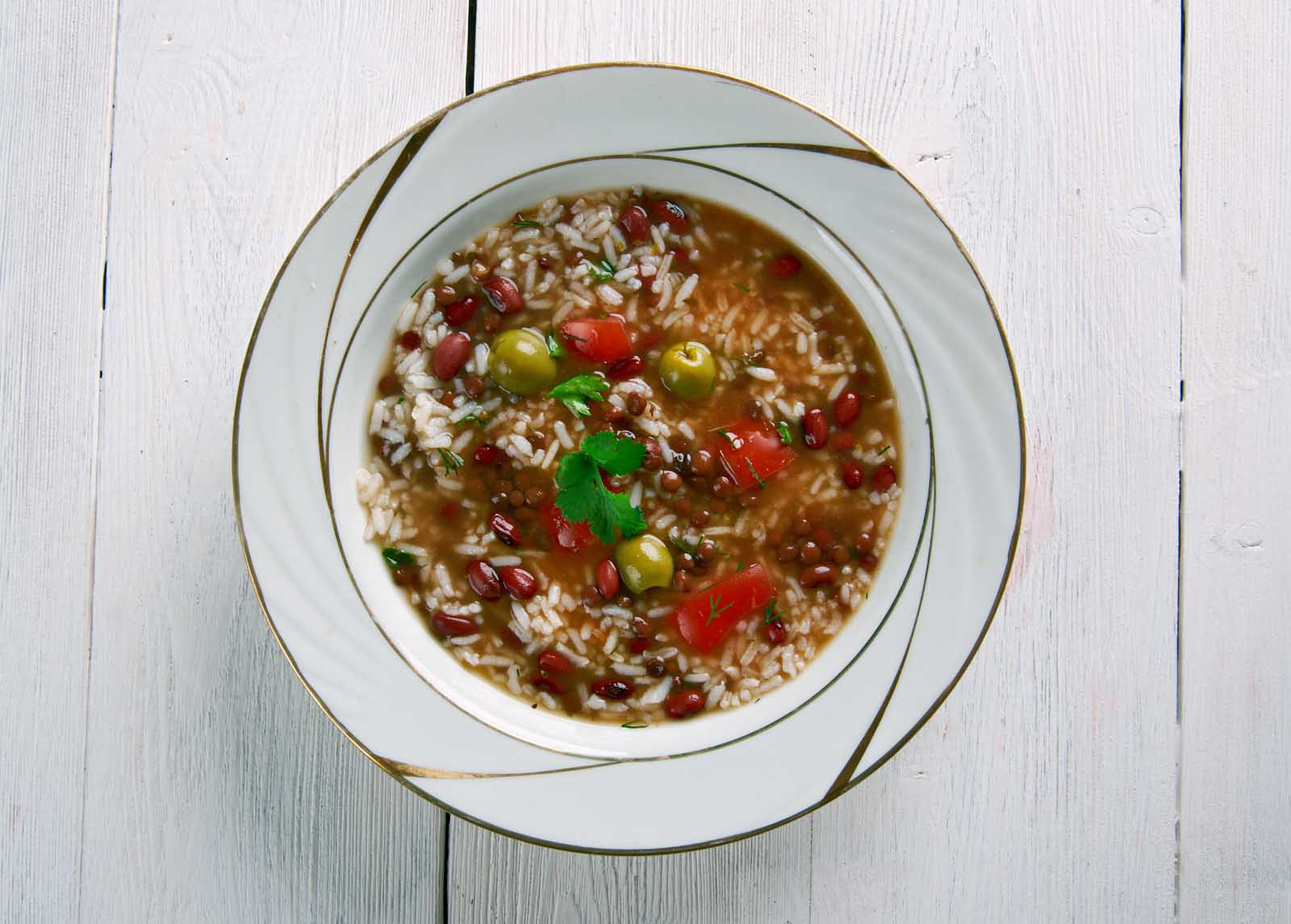
Puerto Rican cooking combines many types of influences and ideas. This is certainly the case with Asopao, which is a mix between a stew and a soup. The dish is always made with white rice, but the added ingredients can change depending on where you go.
Some additions to the rice dish are seafood, pork, or beef. However, the most popular meat choice is chicken, creating the readily found Asopao de Pollo. Both vegetarian and meat options will feature pigeon peas along with spices and olives, tomatoes, onions, and peppers.
Asopao is simple and filling, making the delicious food a common choice for dinner in Puerto Rican households.
9. Arroz con Dulce
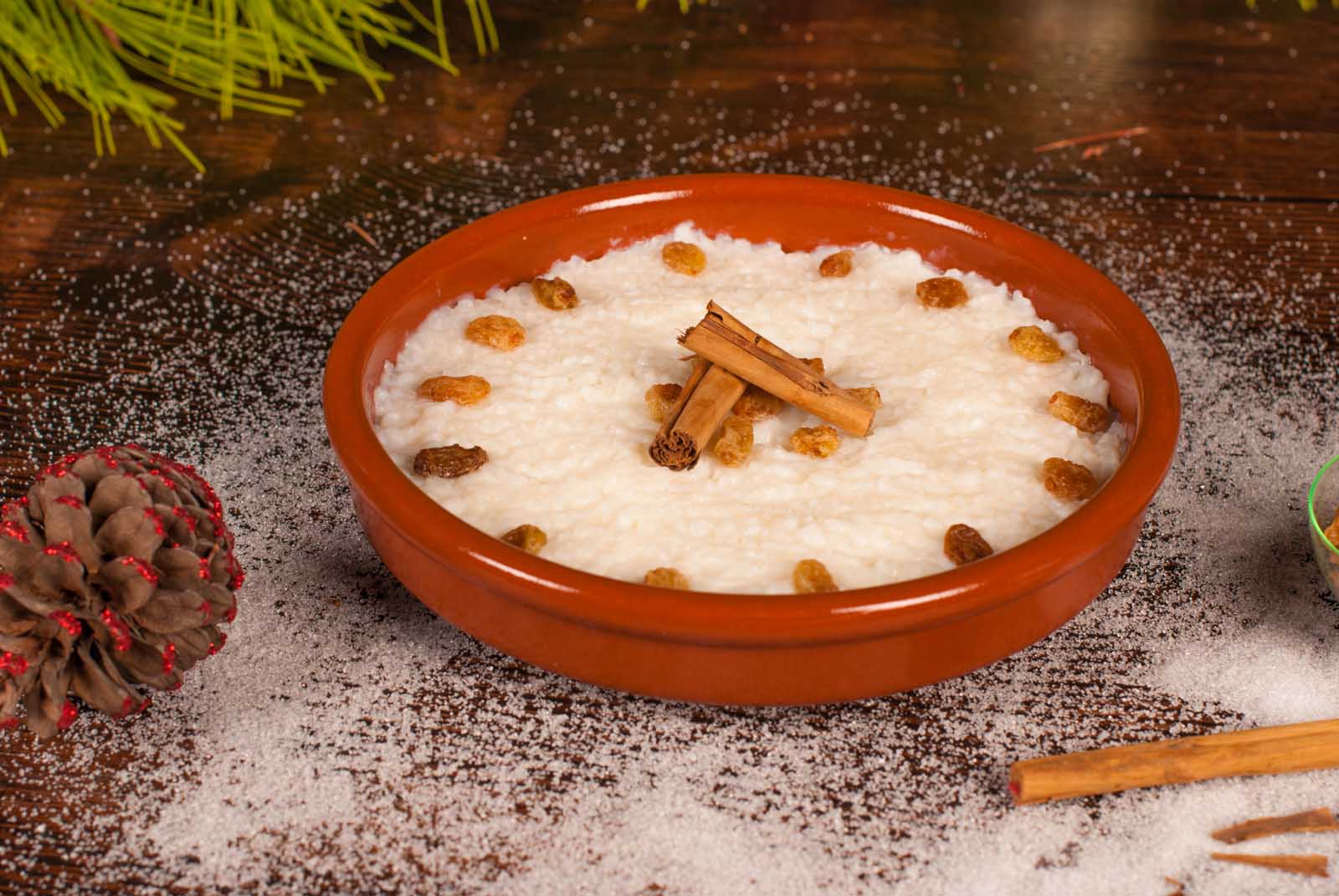
A popular dessert dish in Puerto Rican cuisine, Arroz Con Dulce, is a coconut rice pudding that is a delightful exclamation point for your evening meal. Made from cooking white rice in coconut milk along with cloves, nutmeg, and cinnamon, you’ll be surprised just how sweet cooked rice can taste.
Before being served, Arroz Con Dulce is garnished with raisins plus cinnamon sticks. Although a common dish at restaurants year-round, creamy coconut pudding is a popular choice during the holiday season. Excited to explore the Caribbean? Read our guide to the best Caribbean Islands.
10. Bacalaitos
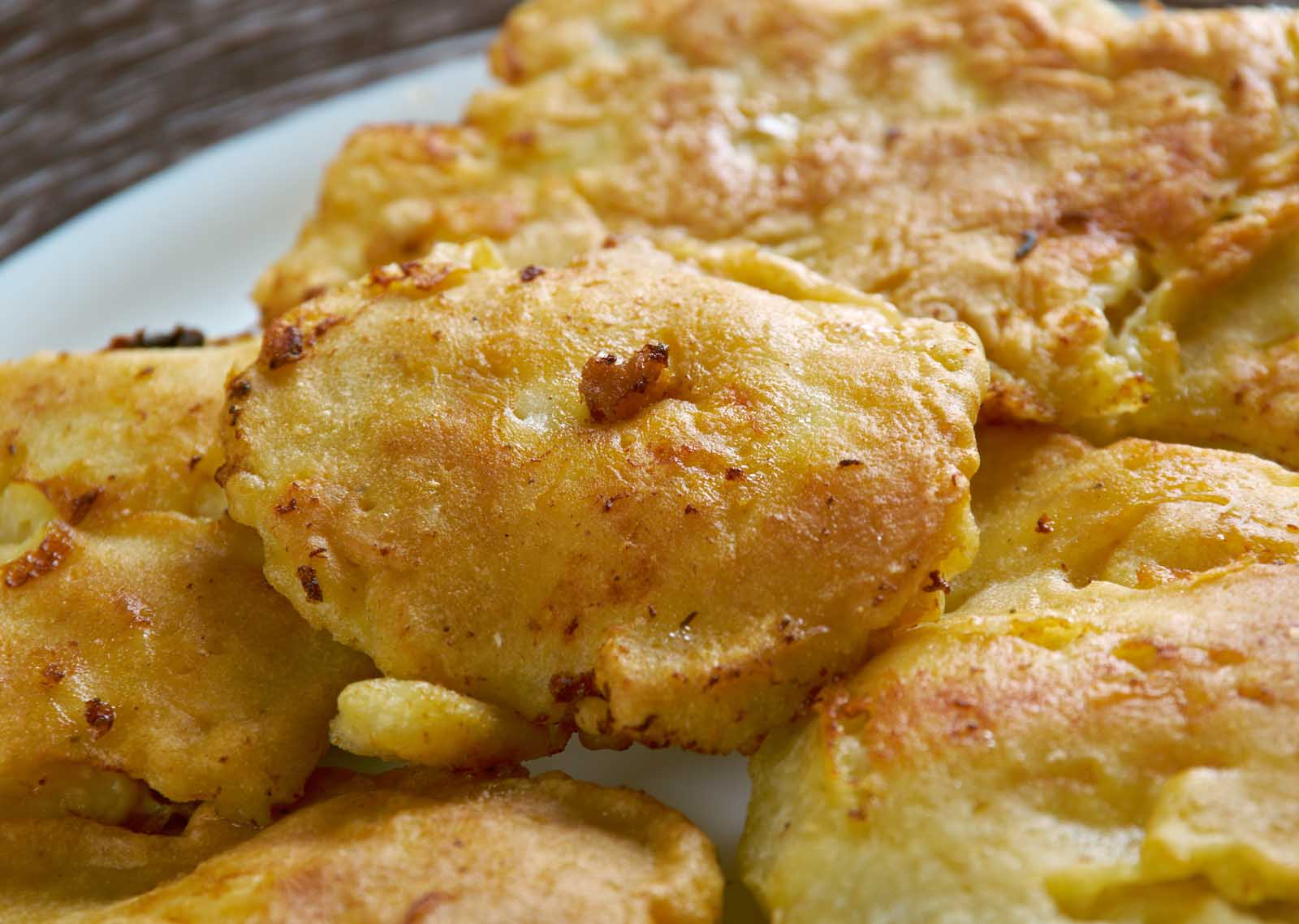
When you’re traveling through the stunning island territory of Puerto Rico, you’ll be spending a lot of time relaxing by the Caribbean Sea. As the sparkling white sands dance between your toes, you won’t have to go far for a quick snack.
Bacalaitos are small cod fritters that are readily found at beach kiosks around Puerto Rico. The codfish (I like to use salted Pollock Chunks) is coated in a batter and deep-fried in oil, providing a crispy exterior with delightfully chewy and soft insides.
The popular beachside treat can also be found in other settings. Street vendors also serve up bacalaitos, while all festivals will have their own version of the fritter.
11. arañitas
The classic Puerto Rican food, arañitas, is comprised of shredded, then fried, plantains. The word arañitas arises from the Spanish word for ‘little spiders’. Indeed, this tasty, savory dish looks like a mash of tiny critters.
However, what it may lack in aesthetic appeal, arañitas makes up for it with a crispy flavor. The ease of creation also allows those at home to bring a taste of Puerto Rico into their kitchens.
Alongside your hot and crunchy Puerto Rican dish, add a dip such as guacamole. Many restaurants around the territory will place a delightful garlic-infused sauce to complement the shredded plantains.
12. Alcapurrias
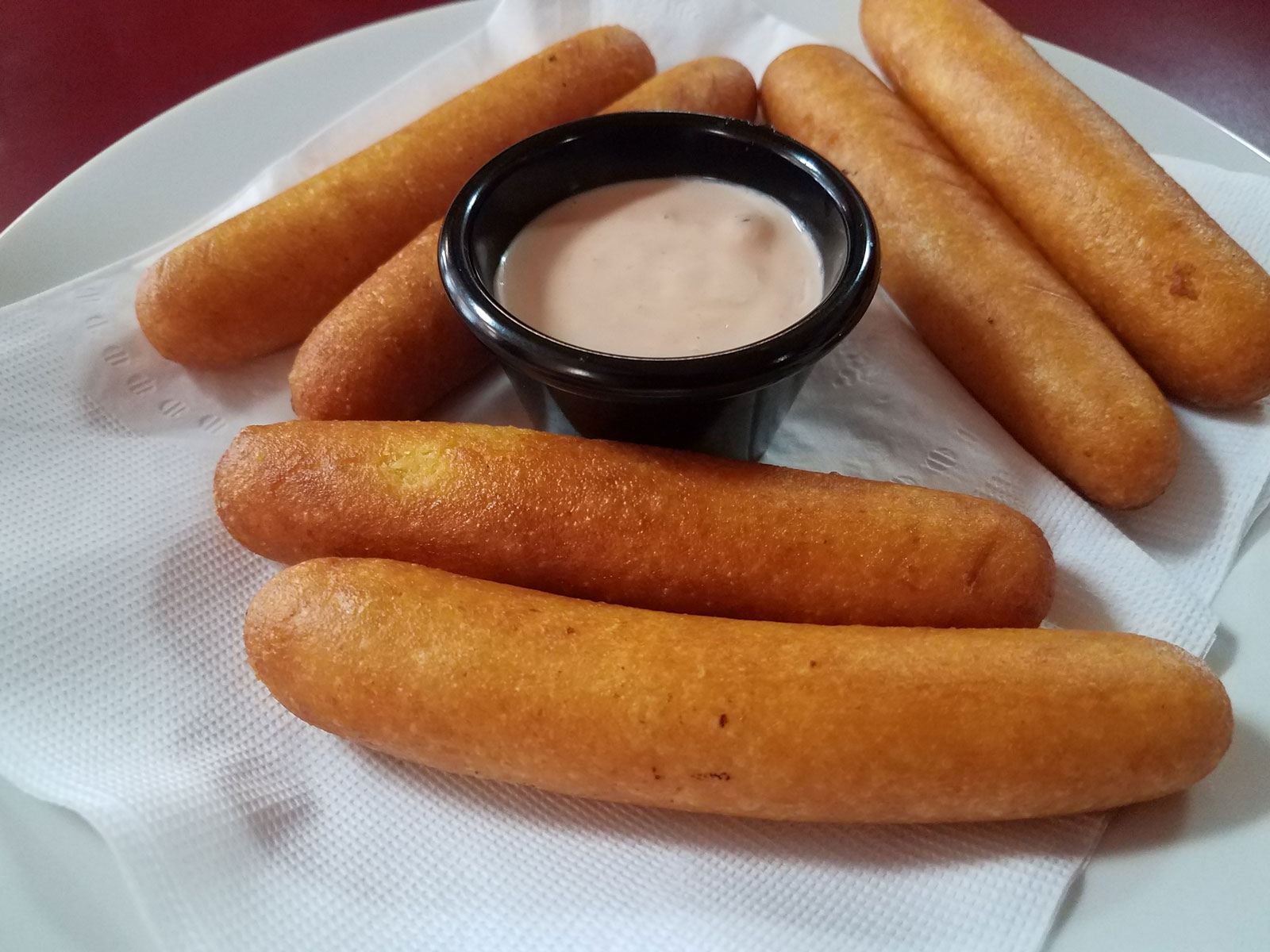
Sold at chinchorros, aka traditional Puerto Rican restaurants that specialize in deep-fried foods, Alcapurrias are made with raw plantain and/or “Yuca” and is made in a similar fashion to pasteles.
You combine shredded green banana with yautia(taro root) then season it with salt and achiote oil. This makes the “masa” or batter. You then grab a banana leaf, or parchment paper if you don’t have one handy, place a bit of the masa onto it, and spread it out a bit. Then add your seasoned beef, fold it all together, and then fry it.
The end result is a dish similar to an American corn dog, but Puerto Ricans have made a fantastic improvement.
13. Tripleta
Puerto Rican foods that make for the perfect lunch meal include the scrumptious Tripleta sandwich. This hearty meal is a meat-lover dream comprising a generous serving of three different types of meat.
The trio of meats used in the aptly named Tripleta is ham, grilled steak, and Lechon pork. Lechon pork is a controversial ingredient in Puerto Rican foods. The pork is derived from the roasting of a suckling pig.
The combination of meats is then combined with a variety of toppings, including mayonnaise, ketchup, plus cheese. Vegetables are also added such as diced cabbage, lettuce, onions, and tomatoes. But to complete the dish, fries are stuffed into the sandwich, giving the hearty meal an extra crunch.
14. Amarillos
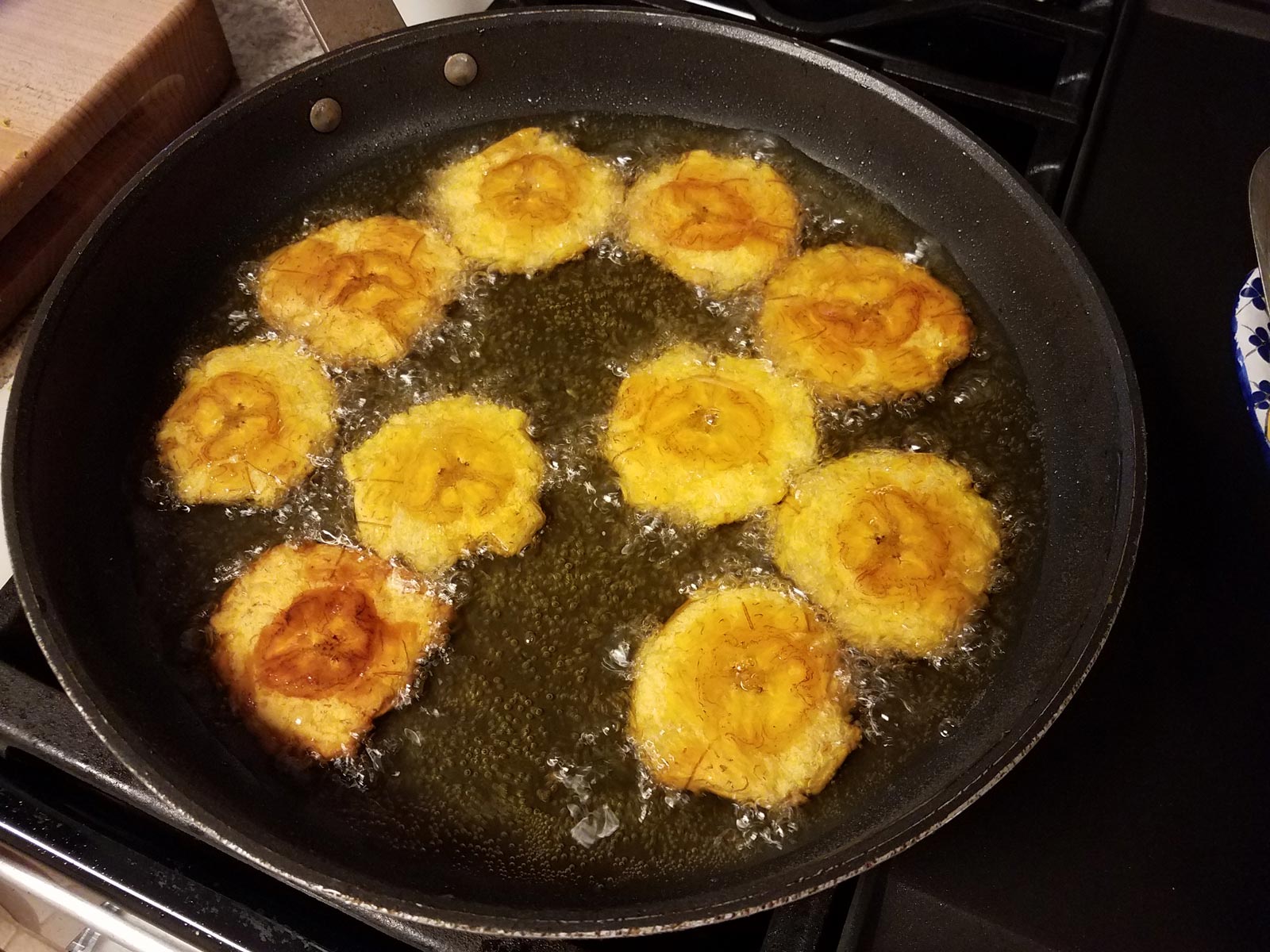
Similar to Tostones (found below) Amarillos are instead the sweet version of one of the best Puerto Rican dishes. Such is the ease of making this side dish that Amarillos are one of the best ways to recreate Puerto Rican food at home.
To begin, find as many ripe plantains (ones that have yellowed or are almost black) as your heart desires. The darker the plantain, the sweeter the taste. Once you have peeled the plantains, slice them up into thin pieces before frying them quickly and only once.
Although Amarillos are sweet, common additions include sprinkled sugar (white or brown) or salt to create a fun balance of flavors. If you’re eating out in Puerto Rico, then Amarillos are a common side dish for your main meal.
15. Pionono
Fried plantains have culinary flexibility matched by a few other ingredients around the world. This is on full display in our next Puerto Rican food. Pionono is made of ripe fried plantains that are transformed into small cups.
From there, picadillo (ground beef) is added along with some thinly chopped onions, chilis, and coriander. Once the fillings are in place, egg wash coats the Pionono before shredded cheese is sprinkled over the top.
The dish is then placed in the oven for a short while before coming out as something akin to a fluffy bakery dish. Some might say it is Puerto Rico’s answer to the meat pie. Check out this Pionono recipe if you want o make it at home.
16. Rellenos de Papa
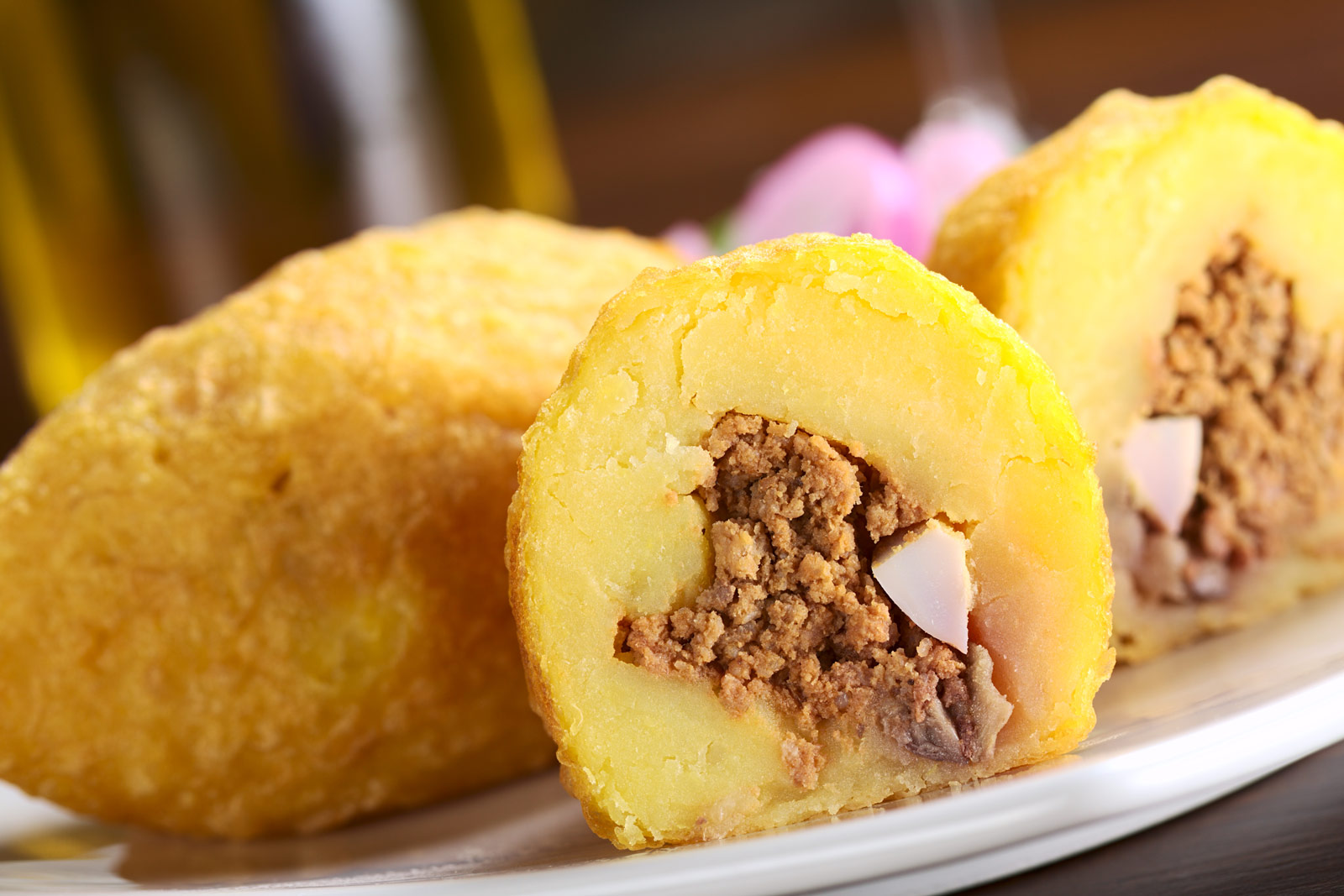
Whether you’re eating out in Puerto Rico at a restaurant or wandering by food trucks or chinchorros, you’ll likely stumble across Rellenos de Papa. One of the most popular Puerto Rican dishes, the potato-based treat, is a common mid-afternoon snack.
Rellenos de Papa comprises mashed potato balls that are filled with ground beef before being deep-fried. The meat filling is called Picadillo and is similar to the filling used in Pastelon. The beef is pan-fried alongside adobo seasoning, Sofrito, olives, garlic, and tomato sauce. The end result is a crispy ball that is like a savory croquette.
17. Bistec Encebollado
Common throughout Latin America, Bistec Encebollado is also readily found around Puerto Rico. The rice and meat dish is bursting with flavor and is a must-try as an evening meal.
The main part of Bistec Encebollado is the beef, which is first marinated in adobo seasoning. The marinating process isn’t a short one either. Tradition recipes call for the beef to sit in the seasoning for up to 12 hours!
So start preparing in the morning, and at night, you’ll have a scrumptious meat dish to enjoy. Complementing the beef are large onion rings with a topping of onion sauce. Round out the hearty meal with a side of white rice, pigeon peas, and some Tostones.
18. Pollo Guisado
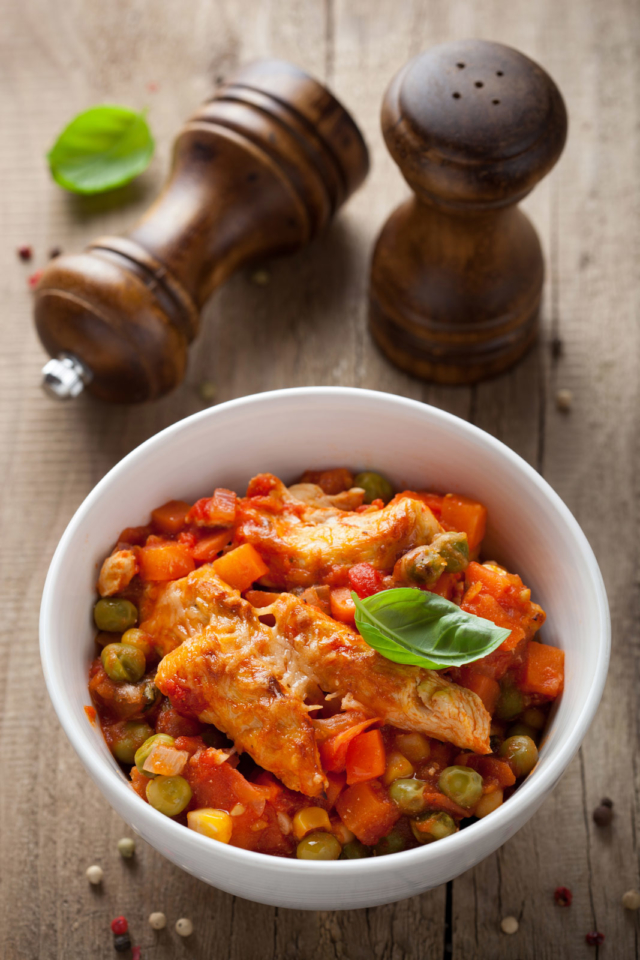
Puerto Rican Pollo Guisado is a delicious and comforting chicken stew that is a staple of Puerto Rican cuisine. The dish has its roots in the Spanish colonial period of Puerto Rico, where it was heavily influenced by Spanish cooking techniques and ingredients. Over time, the dish has evolved to include a mix of indigenous Taino and African flavors and spices.
To make Pollo Guisado, chicken pieces are marinated in a mixture of sofrito (a blend of onions, peppers, garlic, and other herbs), tomato sauce, adobo seasoning, and other spices. The marinated chicken is then seared in a pan to develop a deep, rich flavor. The sofrito and remaining marinade are then added to the pan, along with diced potatoes, carrots, and olives. The chicken and vegetables are simmered together in the sofrito sauce until the chicken is tender and the vegetables are cooked through.
The resulting dish is a flavorful and hearty chicken stew that is perfect for warming up on a cold day. The combination of sofrito, tomato sauce, and spices gives the dish a rich and complex flavor, while the potatoes and carrots add a nice textural contrast. The olives add a tangy and slightly salty flavor that complements the dish perfectly.
19. Sorullitos
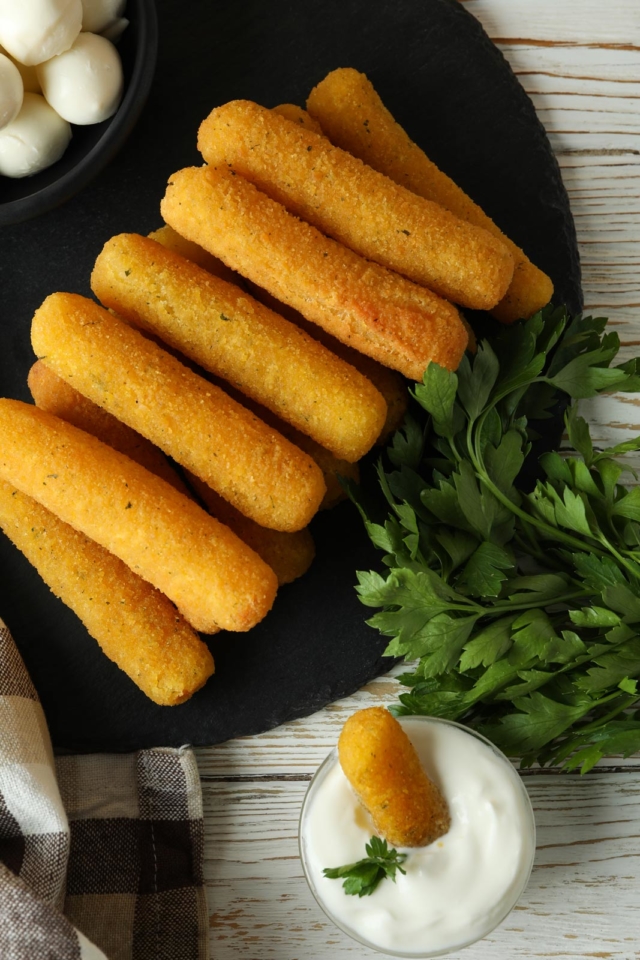
Puerto Rican Sorullitos are a popular snack or side dish in Puerto Rico, made with cornmeal and cheese. The dish has its roots in the indigenous Taino culture of Puerto Rico, which used corn as a staple food. Over time, the dish has evolved to include other ingredients, such as cheese and spices, making it a uniquely Puerto Rican creation.
To make Sorullitos, cornmeal is mixed with water, milk, and a variety of seasonings, including salt, pepper, and sometimes sugar. Cheese, typically a white cheese such as queso blanco, is then added to the mixture. The resulting dough is shaped into small logs or cylinders and deep-fried until golden brown.
The resulting Sorullitos are crispy on the outside and soft and cheesy on the inside, making them a popular snack or side dish. They are often served with a dipping sauce such as mayo-ketchup (a combination of ketchup and mayonnaise) or a spicy garlic sauce.
Sorullitos are loved in Puerto Rico for their crispy texture, cheesy flavor, and versatility. They can be eaten as a snack, a side dish, or even as breakfast food. Their popularity is a testament to the rich culinary traditions of Puerto Rico and the creativity of its people in incorporating new ingredients and flavors into traditional dishes.
20. Tembleque (Coconut Milk Pudding)
Puerto Rican Tembleque is a traditional dessert that is enjoyed during the Christmas season. The name “Tembleque” means “wobbly” or “trembling,” which refers to the dessert’s delicate and jiggly texture. The dish has its roots in Puerto Rico’s indigenous Taino culture, which uses coconut milk as a staple ingredient in many dishes.
To make Tembleque, coconut milk is combined with cornstarch, sugar, and spices such as cinnamon and vanilla. The mixture is heated on the stove until it thickens and begins to boil. The mixture is then poured into a mold, typically a small ramekin or dish, and allowed to cool and set in the refrigerator.
The resulting Tembleque is a creamy, silky, and slightly sweet dessert that is perfect for satisfying a sweet tooth. The delicate texture and coconut flavor make it a unique and refreshing dessert option. It is often served with a sprinkle of cinnamon on top.
Tembleque is a beloved dessert in Puerto Rico, particularly during the Christmas season, when it is often served alongside other traditional holiday foods such as Pasteles and Arroz con Gandules. Its popularity is a testament to the rich culinary traditions and cultural heritage of Puerto Rico, as well as the use of local ingredients such as coconut milk in traditional dishes.
21. Asado de Cerdo
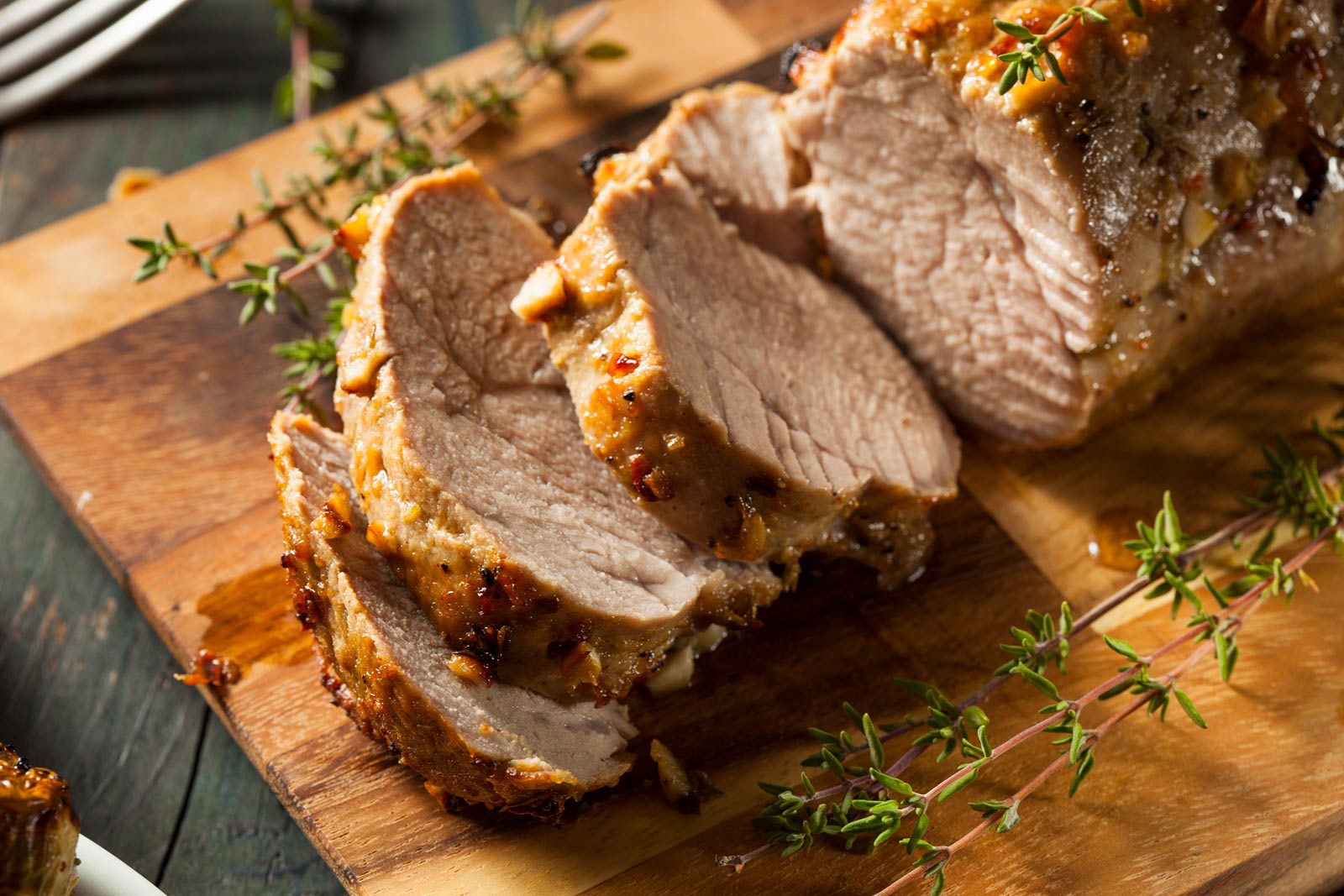
Puerto Rican Asado de Cerdo, also known as Puerto Rican Pork Roast, is a classic dish that is loved throughout the island. Its origins can be traced back to Spain, where it was a popular dish made with roasted pork and a variety of spices.
To make Asado de Cerdo, a pork shoulder or butt is marinated in a mixture of garlic, oregano, salt, pepper, and other spices. The marinated pork is then roasted in the oven until it is tender and juicy. While the pork is cooking, the marinade is reduced and served as a sauce.
The result is a succulent and flavorful pork roast that is perfect for sharing with family and friends. The blend of spices and garlic gives the pork a rich and complex flavor that is unique to Puerto Rican cuisine. The dish is often served with a side of Arroz con Gandules, a traditional Puerto Rican rice dish made with pigeon peas.
22. Arroz con Pollo
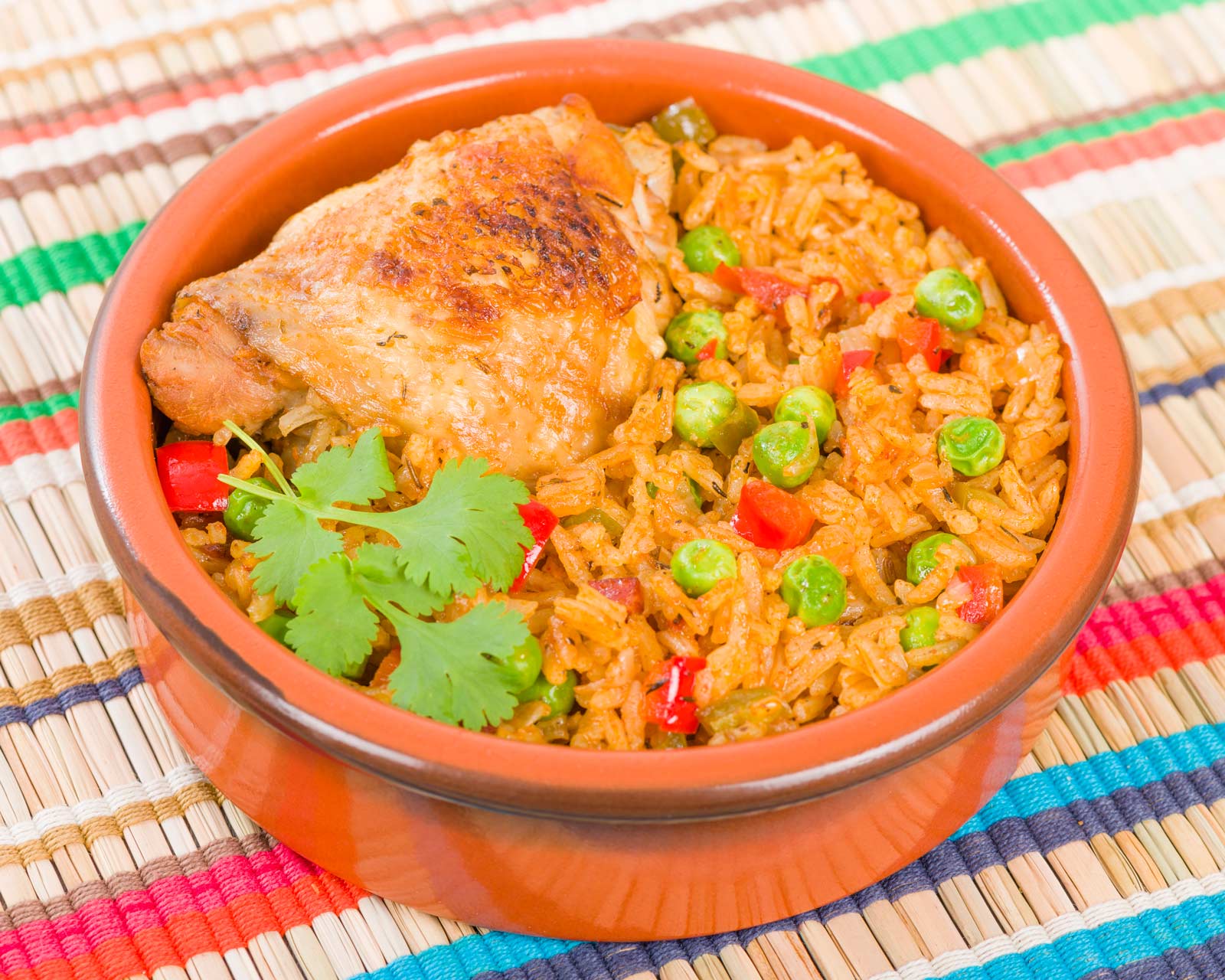
Puerto Rican Arroz con Pollo is a classic dish that is loved throughout the island and is often considered Puerto Rico’s national dish. Its origins can be traced back to the Spanish dish, Arroz con Pollo, which was brought over during colonial times and adapted to the local ingredients and cooking techniques.
To make Arroz con Pollo, chicken pieces are marinated in a mixture of garlic, oregano, salt, pepper, and other spices. The chicken is then browned in a large pot, along with onions, peppers, and other aromatics. Rice, water, and chicken broth are added to the pot, along with additional spices such as saffron or annatto, and the mixture is simmered until the rice is tender and the chicken is cooked through.
The result is a flavorful and comforting one-pot meal that is perfect for feeding a crowd. The combination of spices, vegetables, and tender chicken gives the dish a depth of flavor that is unique to Puerto Rican cuisine. It is often served with a side of sweet plantains and a simple salad.
Traditional Puerto Rican Cuisine FAQ
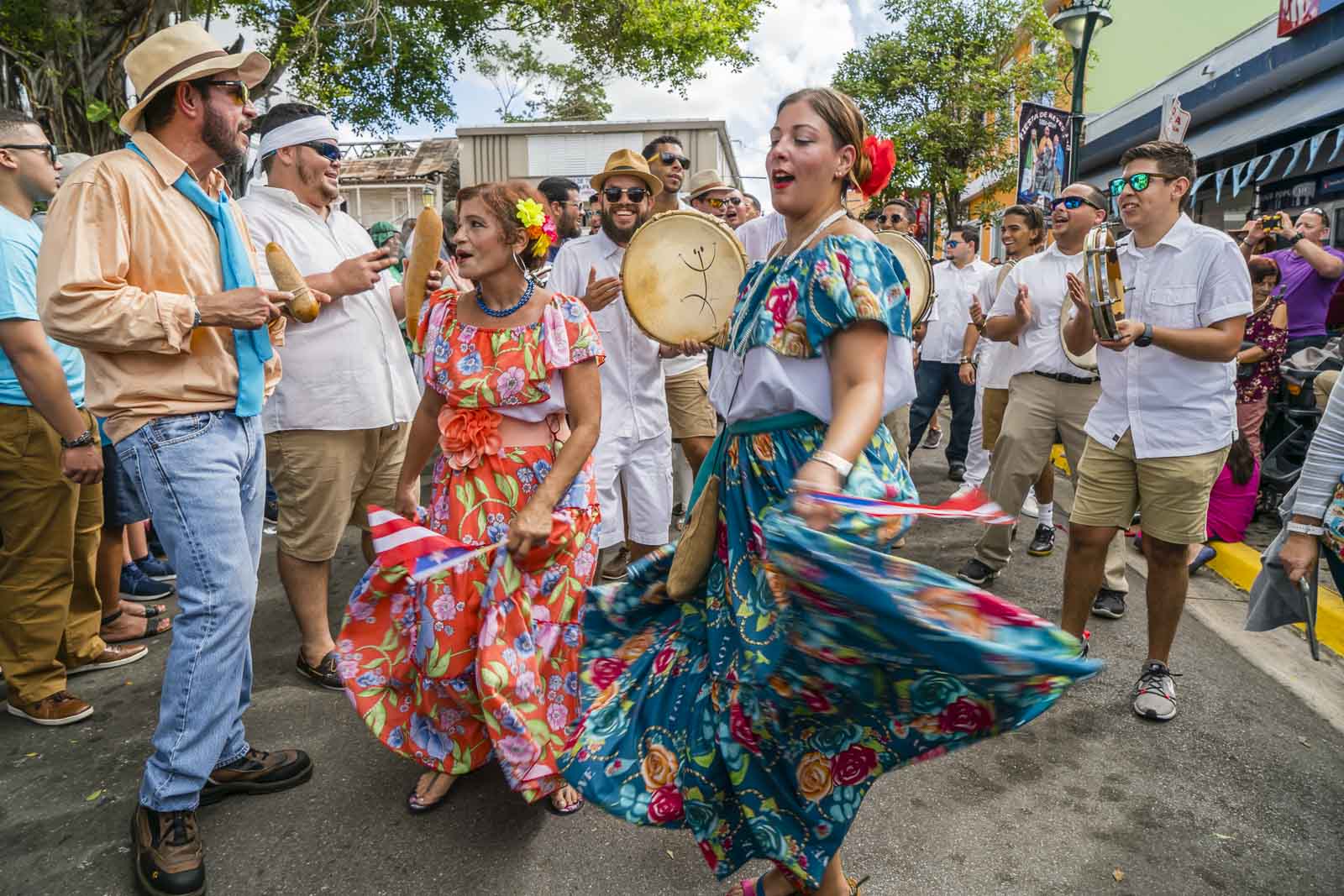
What is traditional Puerto Rican food?
One of the most important aspects of Puerto Rican cuisine is its use of spices and aromatics, such as garlic, onions, and peppers. These ingredients are often used to create flavorful marinades and seasonings for meats, seafood, and vegetables. Rice and beans are also a staple of Puerto Rican cuisine, with dishes such as arroz con gandules (rice with pigeon peas) and habichuelas guisadas (stewed beans) being among the most popular.
What is the best Puerto Rican Street Food?
Pinchos are arguably the most popular street food in Puerto Rico. These grilled skewers of marinated meat, usually chicken or pork, are a staple of the island’s street food scene. They are often served with a slice of bread and a variety of sauces, such as garlic, cilantro, or chipotle mayo.
Is Puerto Rican food spicy?
Puerto Rican food can vary in spiciness, depending on the dish and the preferences of the person preparing it. Some dishes, such as mofongo or asopao, may be mild and flavorful without being spicy at all. Other dishes, such as arroz con habichuelas, may have a bit of a kick from the addition of peppers or spices. Overall Puerto Reican Food is not overly spicy.
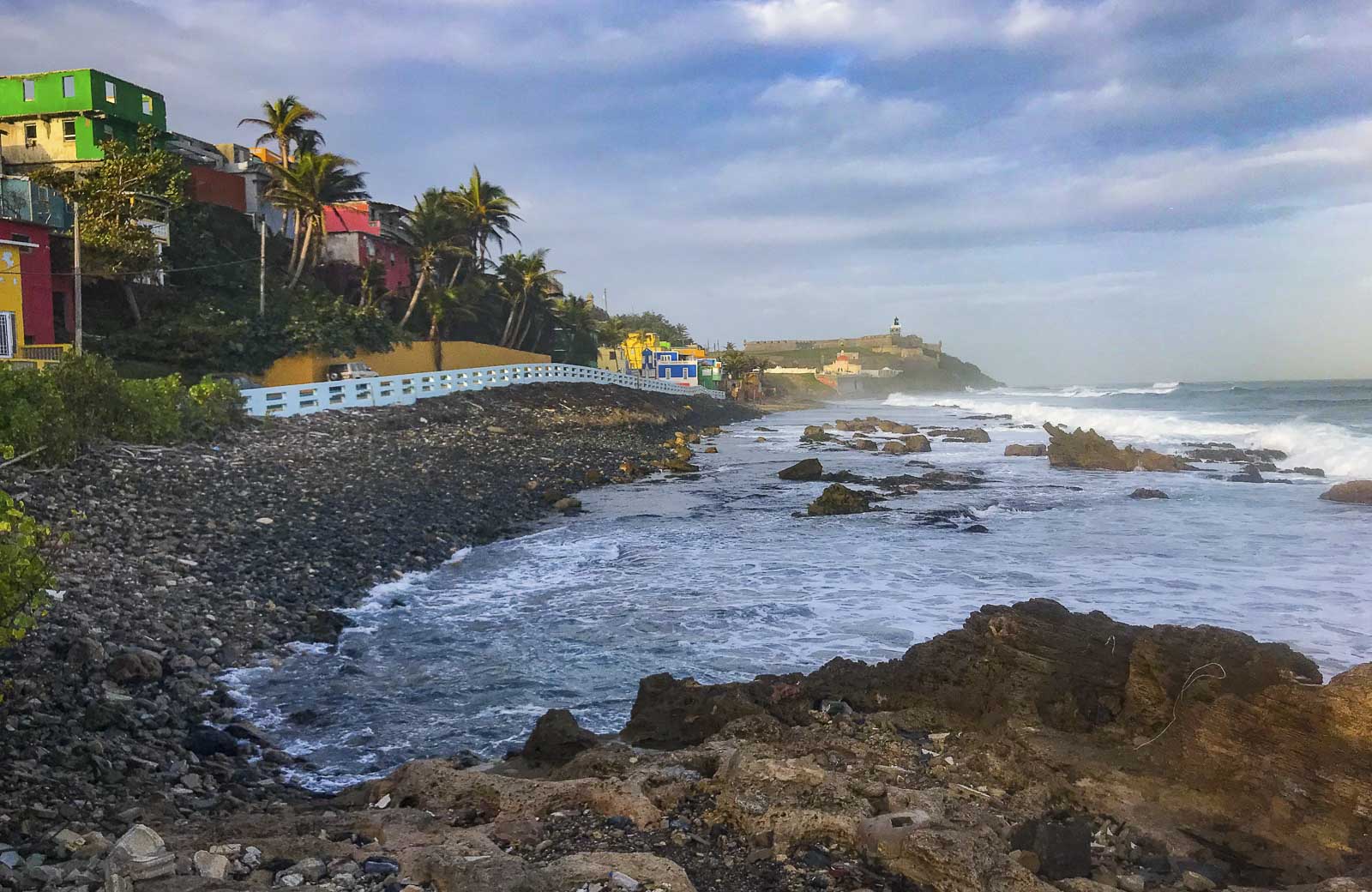
Eating around Puerto Rico is a treat and provides travelers with the best culinary experience in the region. A proper appetite will be needed to tick off the full breadth of options on the list. Thankfully, many local dishes are easy to make at home.
But it isn’t just the traditional cuisine that puts a smile on the faces of those that visit. The restaurant scene in Puerto Rico is innovative, finding new ways to thrill while maintaining authenticity.
From the basic fritters and plantain-based dishes to Asopao and the sweet Arroz Con Dulce, the food here promises to be as memorable as the beaches.
Ready to explore more Caribbean Cuisine? Read our guide to Cuban food.




I love all of the Puerto Rican food mentioned above. My favorite will always be Mofongo! Another food you must try are Pasteles. =)
Nice work guys
Correction: It’s masa not mesa and arañitas not aranitas.
I loved your article, it made me hungry and hoping to get to the Island soon; one small correction, small on the side of the road restaurants are called “chinchorros”, not cuchifritos, which it’s another food in itself. Thanks!
Great review! While reading it,a lot of family gathering memories also flooded my mind. Although some things might be mixed up. For example, alcapurrias are made with raw plantain and/or “Yuca”. You shred them, and salt or spices and a little bit of annatto oil. You fill them with the beef or better with Crab, you cover the meat with more batter and then you fry it until it is golden. If you have ever tried it you will never forget it.
Mofongos is the one you start frying the green plantain until it is crispy on the outside and soft on the inside. Then you placed the pieces in the morter (“pilón”) with garlic, salt, and a little chicken broth and you smash it. You can add pork crackling. You form a ball and served it right away.
Same here. God bless. I also come from the Jimenez family. Saludos !?
Just to be clear.. Mofongo is from Puerto Rico. The other versions you mentioned from the Dominican Republic and Cuba is made completely different than Mofongo. They also have their own names. Mangu is Dominican and Fufu is Cuban.
True but they all originate from Africa.